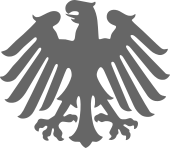German Federal Council Deutscher Bundesrat | |
|---|---|
| 75th year of business | |
 | |
| History | |
| Founded | 23 May 1949 |
| Leadership | |
First Vice President | |
Second Vice President | |
| Structure | |
| Seats | 69 seats |
 | |
| Elections | |
| Appointment by State Governments | |
| Meeting place | |
 | |
| Former chamber of the Prussian House of Lords, Berlin | |
| Website | |
| bundesrat | |
| This article is part of a series on the |
| Politics of Germany |
|---|
 |
The German Bundesrat (German: [ˈbʊndəsˌʁaːt] , lit. 'Federal Council') is a legislative body[a] that represents the sixteen Länder (federated states) of Germany at the federal level (German: Bundesebene). The Bundesrat meets at the former Prussian House of Lords in Berlin. Its second seat is located in the former West German capital of Bonn.
The Bundesrat legislates alongside the Bundestag. The Bundesrat consists of members appointed by state governments and the Bundestag consists of representatives directly elected by the German people. Certain laws and all constitutional changes need the consent of both houses. For its somewhat similar function, the Bundesrat is sometimes (controversially) described as an upper house of parliament along the lines of the United States Senate, the Canadian Senate, and the British House of Lords.[a]
The name "Bundesrat" was used by similar bodies in the North German Confederation (1867) and the German Empire (1871). The predecessor of the Bundesrat in the Weimar Republic (1919–1933) was the Reichsrat.
The political makeup of the Bundesrat is affected by changes in power in the states of Germany, and thus by elections in each state. Each state delegation in the Bundesrat is appointed by the state government. In contrast to most parliaments, the members of the Bundesrat do not have a free mandate and all members of a state delegation have to vote the same way in each vote. The Bundesrat is a continuous body and has no legislative periods. For organizational reasons, the Bundesrat structures its legislative calendar in years of business (Geschäftsjahre), beginning each year on 1 November. Each year of business is congruous with the one-year-term of the Presidium of the Bundesrat. The sessions have been counted continuously since the first session on 7 September 1949. The Bundesrat's 1000th session took place on 12 February 2021 and was opened with a speech by President of Germany Frank-Walter Steinmeier.
Cite error: There are <ref group=lower-alpha> tags or {{efn}} templates on this page, but the references will not show without a {{reflist|group=lower-alpha}} template or {{notelist}} template (see the help page).